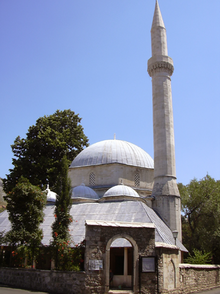Karađoz Bey Mosque
| Karađoz Bey Mosque | |
|---|---|
 | |
| Religion | |
| Affiliation | Sunni Islam |
| Location | |
| Location | Mostar, Bosnia and Herzegovina |
| Geographic coordinates | 43°20′28″N 17°48′50″E / 43.34111°N 17.81389°E |
| Architecture | |
| Architect(s) | Mimar Sinan |
| Type | Mosque |
| Style | Ottoman architecture |
| Completed | 1557 |
| Specifications | |
| Length | 13 metres (43 ft) |
| Width | 13 metres (43 ft) |
| Dome(s) | 1 |
| Dome height (outer) | 16.49 metres (54.1 ft) |
| Dome height (inner) | 15.89 metres (52.1 ft) |
| Dome dia. (outer) | 10.72 metres (35.2 ft) |
| Minaret(s) | 1 |
| Minaret height | 34.50 metres (113.2 ft)[1] |
| Materials | stone |
| Official name: Karađoz-beg mosque in Mostar, the architectural ensemble | |
| Type | Category I cultural monument |
| Criteria | A. B. C. i. iii. iv. v. vi. D. ii..iii. iv. v. E. i..ii. iii..iv. v. F. i..ii. iii. G. i. ii..iii. iv..v..vi. vii. H.i..ii. iii. I. i. ii. iii. |
| Designated | 4 May 2004 |
| Reference no. | 2424 |
| Decision no. | 07.1-2-113/04-1 |
| Listed | List of National Monuments of Bosnia and Herzegovina |
Karađoz Bey Mosque (Bosnian: Karađoz-begova džamija, Turkish: Karagöz Mehmed Bey Camii) is a 16th-century Ottoman mosque in the city of Mostar, Bosnia and Herzegovina.
With its big dome and high minaret, it is one of the largest mosques in the region.
History
[edit]An Arabic foundation inscription on the mosque records that it was commissioned by Mehmed Beg b. Abu al-Saʿadat’ who was a brother of a vizier in the year AH 965 (1557–58). Some scholars have claimed that the vizier was the Ottoman grand vizier Rustem Pasha, but Rustem Pasha is recorded as having only one brother, Sinan Pasha.[2]
The mosque may have been designed by the imperial architect Mimar Sinan. It is in the form of a domed cube fronted by a double portico. The three domes of the inner portico are supported by four marble columns. The outer portico has a shed roof resting on small octagonal pillars. The large 10.65 metres (34.9 ft) dome of the mosque sits on an octagonal fenestrated drum which is supported by eight-pointed arches.[2]
The mosque was severely damaged during World War II, and faced near destruction during the Bosnian War in the early 1990s. However, Karađoz Bey Mosque, like the rest of Mostar, underwent extensive repairs between 2002 and 2004. The mosque was completely renovated and reopened to the public in July 2004.
Bibliography
[edit]- Necipoğlu, Gülru (2005). The Age of Sinan: Architectural Culture in the Ottoman Empire. London: Reaktion Books. ISBN 978-1-86189-253-9.
- Marić, Ante (2006). "Biskupska kuća u Vukodolu" [The episcopal residence in Vukodol]. Hum (in Croatian) (1): 245–249.
References
[edit]- ^ "Karađoz-begova džamija, graditeljska cjelina" [Karagöz Bey Mosque, architectural complex] (in Bosnian). Commission for the Preservation of National Monuments of Bosnia and Herzegovina. 4 May 2004. Archived from the original on 1 February 2014. Retrieved 19 January 2014.
- ^ a b Necipoğlu 2005, p. 441.
- Mosques in Bosnia and Herzegovina
- Attacks on religious buildings and structures during the Bosnian War
- Ottoman mosques in Bosnia and Herzegovina
- Mimar Sinan buildings
- 16th-century mosques
- National Monuments of Bosnia and Herzegovina
- Buildings and structures in Mostar
- Medieval Bosnia and Herzegovina architecture

